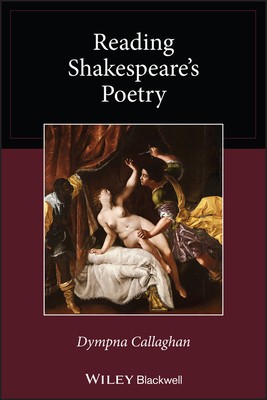
- We will send in 10–14 business days.
- Author: Dympna Callaghan
- Publisher: Wiley-Blackwell
- ISBN-10: 0470659203
- ISBN-13: 9780470659205
- Format: 15.2 x 22.9 x 1.5 cm, minkšti viršeliai
- Language: English
- SAVE -10% with code: EXTRA
Reviews
Description
Reading Shakespeare's PoetryA lively exploration of Shakespeare's poems and how they speak to readers
Reading Shakespeare's Poetry presents a fresh interpretation of Shakespeare's non-dramatic poems, providing insights into the individual poems, their themes and composition, and their relation to the cultural context of Shakespeare's world. Dympna Callaghan considers what makes Shakespeare's language poetic and shows how his poetry is comprised not only of lyrical intensity but also of the language of everyday life.
Presented chronologically, lucidly-written chapters examine Venus and Adonis, Lucrece, The Phoenix and the Turtle, the Sonnets, and A Lover's Complaint. Special attention is paid to the distinctive ways in which lineation, rhyme, verse forms, and meter serve to delineate or erase the boundaries of Shakespeare's poetry. Throughout the book, the author explains how Shakespeare's language is influenced by predecessors such as Ovid and Petrarch while highlighting how ideas about the social and cultural function of poetry permeate Shakespeare's works.
- Offers an eminently readable yet scholarly exploration of the literary importance of Shakespeare's poems
- Explains the technical features of Shakespeare's poetic language
- Addresses the significance of the material form in which Shakespeare's poems appear
- Includes a discussion of songs, poems, and sonnets embedded in Shakespeare's dramatic verse
Reading Shakespeare's Poetry is both a fresh and indispensable guide to the poems and a significant critical intervention. This is a must-have book for scholars, students, and general readers alike.
EXTRA 10 % discount with code: EXTRA
The promotion ends in 21d.14:55:51
The discount code is valid when purchasing from 10 €. Discounts do not stack.
- Author: Dympna Callaghan
- Publisher: Wiley-Blackwell
- ISBN-10: 0470659203
- ISBN-13: 9780470659205
- Format: 15.2 x 22.9 x 1.5 cm, minkšti viršeliai
- Language: English English
A lively exploration of Shakespeare's poems and how they speak to readers
Reading Shakespeare's Poetry presents a fresh interpretation of Shakespeare's non-dramatic poems, providing insights into the individual poems, their themes and composition, and their relation to the cultural context of Shakespeare's world. Dympna Callaghan considers what makes Shakespeare's language poetic and shows how his poetry is comprised not only of lyrical intensity but also of the language of everyday life.
Presented chronologically, lucidly-written chapters examine Venus and Adonis, Lucrece, The Phoenix and the Turtle, the Sonnets, and A Lover's Complaint. Special attention is paid to the distinctive ways in which lineation, rhyme, verse forms, and meter serve to delineate or erase the boundaries of Shakespeare's poetry. Throughout the book, the author explains how Shakespeare's language is influenced by predecessors such as Ovid and Petrarch while highlighting how ideas about the social and cultural function of poetry permeate Shakespeare's works.
- Offers an eminently readable yet scholarly exploration of the literary importance of Shakespeare's poems
- Explains the technical features of Shakespeare's poetic language
- Addresses the significance of the material form in which Shakespeare's poems appear
- Includes a discussion of songs, poems, and sonnets embedded in Shakespeare's dramatic verse
Reading Shakespeare's Poetry is both a fresh and indispensable guide to the poems and a significant critical intervention. This is a must-have book for scholars, students, and general readers alike.


Reviews